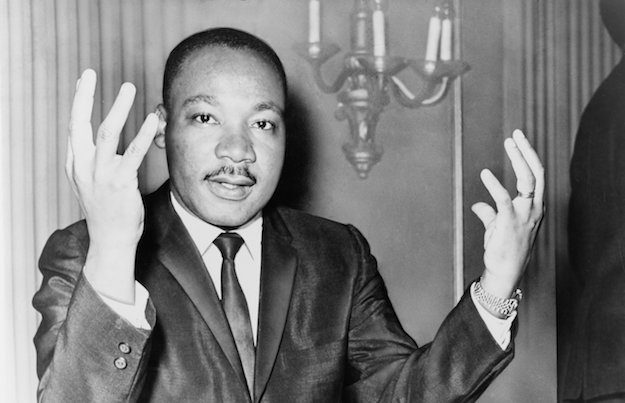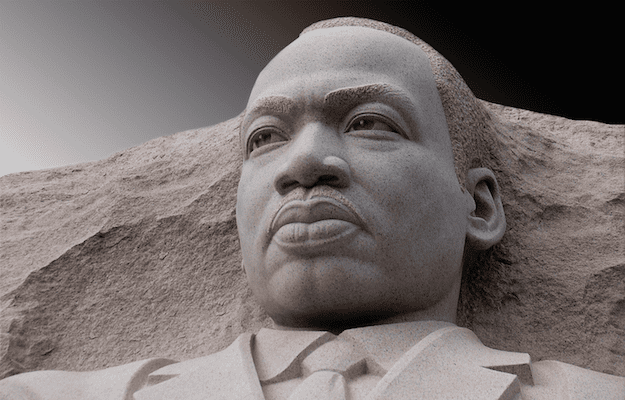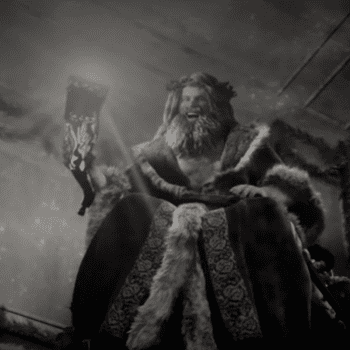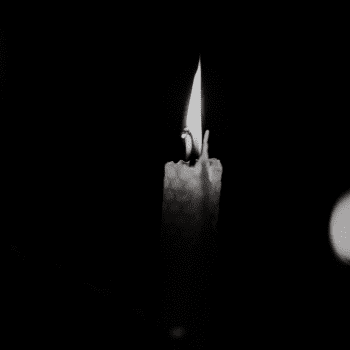The following is a guest post by James Gribble. His bio is at the bottom.
Every #MLKDay, without fail, that one line about content-of-character vs color-of-skin from that one speech Dr. King gave that everybody knows about pops up all out of context. And this serves a purpose: to remind us that the struggle isn’t over and the dream has yet to become reality.
Likely by the same mechanism by which we claim Jesus’ “Blessed are you when you are persecuted” but miss his “Blessed are the peacemakers,” we somehow hear Dr. King decry racial discrimination but miss the part in the same speech when he says, “We can never be satisfied as long as the Negro is the victim of the unspeakable horrors of police brutality.”
Yet, if King’s work and philosophy is, to us, fully summed up in his opposition to segregation to personal, explicit, racial bigotry, then we are not so much as honoring his pinky toe.
This week, on Martin Luther King Jr. day, a nationalist, pro-war, predatory-capitalist, land baron gave the convocation at a “Christian university,” a direct indictment on the state of our collective memory. We have forgotten our history.
We have found a way to simultaneously celebrate Dr. King and literally everything he stood against, casting out demons by the finger of Beelzebub. But it can’t end well for a house divided. It won’t end well for us. Sure, we can continue to ignore King’s message and wield him like a weapon against our political opponents. But we can also let him speak for himself see what we can learn from him.
But there’s a risk in that. If we let Dr. King (or, for that matter, President Carter, Mother Theresa, Dorothy Day, Mahatma Gandhi, James the Just, the prophet Amos, Jesus, etc.) speak, we may find that his message indicts our ideologies and our participation in perpetuating injustice, at least as much as our it indicts our ideological counterparts.
If we let King speak, we may find that we want to kill him all over again. We may even find reason to consider him “the most dangerous man in America.”
If we let King speak, he may say right along with John the Baptizer, “If you have two coats, you have too many.”
If we let King speak, he may say right along with Jesus, “Lend to everyone who wishes to borrow from you.”
If we let King speak, he may say right along with the apostle Paul, “Don’t fight evil with more evil. But, if your enemy has a need, meet it.”
If we let King speak about racism, he will insist that the deadliest forms are not explicit and personal, but systematic, structural, & internalized:
These children—unoffending, innocent, and beautiful—were the victims of one of the most vicious and tragic crimes ever perpetrated against humanity.
And yet they died nobly. They are the martyred heroines of a holy crusade for freedom and human dignity. And so this afternoon in a real sense they have something to say to each of us in their death. They have something to say to every minister of the gospel who has remained silent behind the safe security of stained-glass windows. They have something to say to every politician who has fed his constituents with the stale bread of hatred and the spoiled meat of racism. They have something to say to a federal government that has compromised with the undemocratic practices of southern Dixiecrats and the blatant hypocrisy of right-wing northern Republicans. They have something to say to every Negro who has passively accepted the evil system of segregation and who has stood on the sidelines in a mighty struggle for justice. They say to each of us, black and white alike, that we must substitute courage for caution. They say to us that we must be concerned not merely about who murdered them, but about the system, the way of life, the philosophy which produced the murderers. Their death says to us that we must work passionately and unrelentingly for the realization of the American dream.
If we let King speak on poverty, he may insist that charity and individual hand-outs are only temporary stopgaps which help to stem the tide of poverty – while we work to dismantle the whole US economic system and replace it with one in which people are prized above possessions:
I am convinced that if we are to get on to the right side of the world revolution, we as a nation must undergo a radical revolution of values. We must rapidly begin, we must rapidly begin the shift from a thing-oriented society to a person-oriented society. When machines and computers, profit motives and property rights, are considered more important than people, the giant triplets of racism, extreme materialism, and militarism are incapable of being conquered.
A true revolution of values will soon cause us to question the fairness and justice of many of our past and present policies. On the one hand we are called to play the Good Samaritan on life’s roadside, but that will be only an initial act. One day we must come to see that the whole Jericho Road must be transformed so that men and women will not be constantly beaten and robbed as they make their journey on life’s highway. True compassion is more than flinging a coin to a beggar. It comes to see than an edifice which produces beggars needs restructuring.
If we let King speak, he may insist that White people who harbor no excessive personal animosity toward people of color, yet seek to preserve law, order, comfort, and amity above all else, only actually succeed in maintaining the deadliest forms of White Supremacy and are the strongest threat to movement for Black freedom:
We should never forget that everything Adolf Hitler did in Germany was “legal” and everything the Hungarian freedom fighters did in Hungary was “illegal.” It was “illegal” to aid and comfort a Jew in Hitler’s Germany. Even so, I am sure that, had I lived in Germany at the time, I would have aided and comforted my Jewish brothers. If today I lived in a Communist country where certain principles dear to the Christian faith are suppressed, I would openly advocate disobeying that country’s antireligious laws.
I must make two honest confessions to you, my Christian and Jewish brothers. First, I must confess that over the past few years I have been gravely disappointed with the white moderate. I have almost reached the regrettable conclusion that the Negro’s great stumbling block in his stride toward freedom is not the White Citizen’s Counciler or the Ku Klux Klanner, but the white moderate, who is more devoted to “order” than to justice; who prefers a negative peace which is the absence of tension to a positive peace which is the presence of justice; who constantly says: “I agree with you in the goal you seek, but I cannot agree with your methods of direct action”; who paternalistically believes he can set the timetable for another man’s freedom; who lives by a mythical concept of time and who constantly advises the Negro to wait for a “more convenient season.” Shallow understanding from people of good will is more frustrating than absolute misunderstanding from people of ill will. Lukewarm acceptance is much more bewildering than outright rejection.
I had hoped that the white moderate would understand that law and order exist for the purpose of establishing justice and that when they fail in this purpose they become the dangerously structured dams that block the flow of social progress. I had hoped that the white moderate would understand that the present tension in the South is a necessary phase of the transition from an obnoxious negative peace, in which the Negro passively accepted his unjust plight, to a substantive and positive peace, in which all men will respect the dignity and worth of human personality. Actually, we who engage in nonviolent direct action are not the creators of tension. We merely bring to the surface the hidden tension that is already alive. We bring it out in the open, where it can be seen and dealt with. Like a boil that can never be cured so long as it is covered up but must be opened with all its ugliness to the natural medicines of air and light, injustice must be exposed, with all the tension its exposure creates, to the light of human conscience and the air of national opinion before it can be cured.”
If we let King speak and we listen–if we really listen–we may hear him say something that we’ve never heard him say before and it just might be exactly what 2016 USA needs to hear.
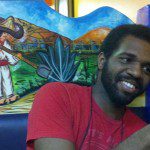 James [Gribble Jr.] is a husband and a father of two, living in a small town in Middle Tennessee, where he was raised. There, he and his family attend a new multi-ethnic, multi-cultural, multi-generational, Evangelical church plant. He is also on rotation to lead liturgical worship services as a member of a progressive, Emergent worship collective. He is a poet in his free time, a musician in his mind, a peon at work, and a giant/horsey/trampoline/pillow/climbing-wall at home. He believes that the journey of life in Christ as both the destination and the path, that the meaning of life is the adventure of that journey, and that the Spirit of God is, in every moment, calling the whole world toward Christ one step at a time. He is seeking to respond to that call with increasing love for his neighbor, hope in God’s good future, and trust in the revelation of God in Christ.
James [Gribble Jr.] is a husband and a father of two, living in a small town in Middle Tennessee, where he was raised. There, he and his family attend a new multi-ethnic, multi-cultural, multi-generational, Evangelical church plant. He is also on rotation to lead liturgical worship services as a member of a progressive, Emergent worship collective. He is a poet in his free time, a musician in his mind, a peon at work, and a giant/horsey/trampoline/pillow/climbing-wall at home. He believes that the journey of life in Christ as both the destination and the path, that the meaning of life is the adventure of that journey, and that the Spirit of God is, in every moment, calling the whole world toward Christ one step at a time. He is seeking to respond to that call with increasing love for his neighbor, hope in God’s good future, and trust in the revelation of God in Christ.

